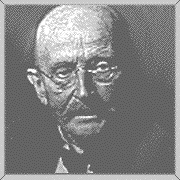 Max
Karl Ernst Ludwig Planck was born in Germany on April
23, 1858. He received his Ph.D. from the University of Munich,
Germany in 1870. Following graduation he taught at the University of
Kiel and the University of Berlin. Eventually he became the director
of the Planck Institute of Theoretical Physics.
Max
Karl Ernst Ludwig Planck was born in Germany on April
23, 1858. He received his Ph.D. from the University of Munich,
Germany in 1870. Following graduation he taught at the University of
Kiel and the University of Berlin. Eventually he became the director
of the Planck Institute of Theoretical Physics.
During his career he studied blackbody radiation and discovered that long wavelengths did not obey the distribution laws written by Wien. This led to his discovery that an oscillator could emit energy in discrete quanta, thus the formation of the quantum theory.
For his work in physics he was awarded the Nobel Prize in physics in 1918. Planck also worked in thermodynamics and electrodynamics during his career.
Planck died on October 3, 1947.
References
Asimov, I. (1964). Asimov's Biographical Encyclopedia of Science and Technology: The Living Stories of More than 1000 Great Scientists from the Age of Greece to the Space Age Chronologically Arranged. Garden City, NY: Doubleday.
Daintith, J., Mitchell, S., & Tootill, E. (1981). A Biographical Encyclopedia of Scientists. New York: Facts on File.
Howard, A.V. (1951). Chamber's Dictionary of Scientists. London: Chambers.
Ireland, N.O. (1962). Index to Scientists of the World, from Ancient to Modern Times: Biographies and Portraits. Boston, MA: Faxon.
McGraw-Hill (1966). McGraw-Hill Modern Men of Science. New York: McGraw-Hill.